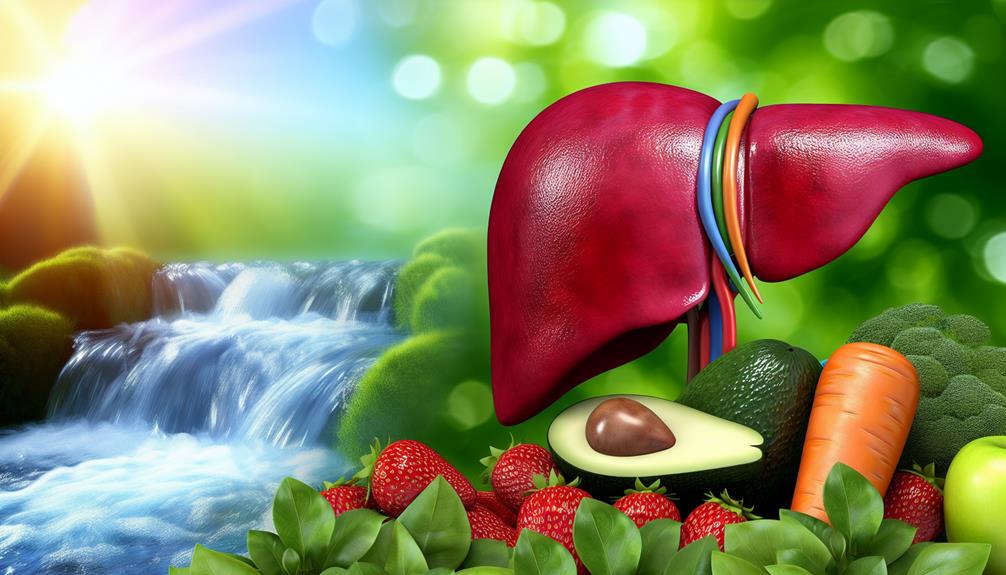

You might find it interesting that just as you were considering how often you hear about liver detox diets, the liver itself is already hard at work managing toxins and processing nutrients. Understanding the intricate liver functions can reveal a lot about your overall health. The liver’s two-phase detoxification process is particularly fascinating, as it transforms harmful substances for elimination. Yet, many misconceptions surround how this organ cleanses itself. What if everything you thought you knew about liver detoxification was built on myth?
Key Takeaways
- The liver plays a crucial role in digestion, detoxification, and nutrient metabolism, maintaining overall health and homeostasis.
- Detoxification occurs in two phases: modification of toxins (Phase I) and conjugation for elimination (Phase II).
- Common liver disorders include hepatitis, fatty liver disease, cirrhosis, and liver cancer, which can severely impact health.
- Symptoms of liver dysfunction include fatigue, jaundice, digestive issues, abdominal pain, and elevated liver enzymes.
- Supporting liver health involves a balanced diet, regular exercise, hydration, and reducing alcohol and processed food intake.
Role of the Liver
The liver plays an essential role in maintaining your body’s overall health and homeostasis. It’s a powerhouse for biochemical processes, significant for digestion and detoxification. One of the liver’s remarkable abilities is liver regeneration; it can recover from injury or disease by generating new cells. This capacity guarantees that even if a portion of the liver is damaged, it can often restore its function.
Liver enzymes are fundamental indicators of your liver’s health. They facilitate various biochemical reactions, including the metabolism of fats, proteins, and carbohydrates. When liver cells are damaged, these enzymes leak into the bloodstream, signaling potential issues. Monitoring liver enzyme levels can help you and your healthcare provider assess liver function and detect conditions such as hepatitis or fatty liver disease.
Additionally, the liver plays an important role in filtering toxins from your blood, storing vitamins and minerals, and producing bile to aid in digestion.
Understanding these functions can help you appreciate the liver’s importance in overall health and the need for maintaining its well-being through a balanced diet, regular exercise, and avoiding excessive alcohol consumption.
Liver Anatomy Overview
The liver is a large, wedge-shaped organ located in the upper right abdomen, just below the diaphragm.

It consists of distinct functional zones that play essential roles in metabolism, detoxification, and bile production.
Understanding its structure and location helps you appreciate how the liver efficiently carries out its important functions.
Liver Structure and Location
Situated beneath the diaphragm on the right side of your abdomen, the liver is an essential organ with a complex structure that plays an important role in various bodily functions. Weighing about three pounds, it’s the largest internal organ, divided into two main lobes—right and left. Each lobe is further subdivided into smaller functional units called lobules.
The liver receives its blood supply from two sources: the hepatic artery and the portal vein. The hepatic artery supplies oxygen-rich blood, while the portal vein brings nutrient-rich blood from the digestive tract. This dual blood supply is vital for the liver’s metabolic activities and detoxification processes.
Within the liver, you’ll find several liver cell types, each with specific functions. Hepatocytes, the primary cell type, are responsible for metabolism and detoxification. Sinusoidal endothelial cells facilitate blood flow and filtration. Kupffer cells, a type of macrophage, play a role in immune function by clearing pathogens and dead cells.
Understanding the liver’s structure and its diverse cell types is essential for appreciating how it maintains overall health and homeostasis in your body.

Key Functional Zones
Understanding the liver’s key functional zones is essential for grasping how this organ operates. The liver is organized into functional zones, which are vital for its metabolic and detoxification processes. Each zone plays a distinct role, helping the liver efficiently manage blood flow and nutrient processing.
The liver lobules, the structural units of the liver, are divided into three main functional zones:
- Zone 1: Closest to the portal triad, this zone is primarily involved in nutrient uptake and oxygen utilization.
- Zone 2: This shifting zone performs a mix of functions, including detoxification and synthesis of certain proteins.
- Zone 3: Furthest from the blood supply, this zone is responsible for the breakdown of drugs and metabolism of toxic substances.
Detoxification Process Explained
Detoxifying the body is one of the liver’s primary functions, playing an essential role in maintaining overall health. The liver processes and breaks down toxins that enter your system from food, medications, and environmental substances.
This natural detoxification involves two main phases: Phase I and Phase II.
In Phase I, enzymes modify toxins to make them more water-soluble, preparing them for elimination. In Phase II, these modified toxins undergo conjugation, where they bind with other substances to form compounds that your body can excrete easily through urine or bile.
It’s vital to debunk some common detox myths. For instance, the idea that you need to follow extreme detox diets or use special cleanses is misleading.
Your liver is already an efficient detox system, capable of handling typical toxin exposure without drastic measures. Instead, supporting liver health through a balanced diet, hydration, and regular exercise is far more effective.
Nutrient Metabolism Functions
After processing toxins, the liver’s role extends to nutrient metabolism, which is fundamental for energy production and overall health. It regulates various metabolic pathways that guarantee your body efficiently utilizes the nutrients you consume.
Key functions of the liver in nutrient metabolism include:
- Protein synthesis: The liver produces essential proteins necessary for blood clotting and hormone regulation.
- Carbohydrate metabolism: It converts excess glucose into glycogen for storage, releasing it back into the bloodstream as needed, maintaining blood sugar levels.
- Fat storage: The liver stores fats and converts them into energy when required, while also processing dietary fats and transporting them through the bloodstream.
Moreover, the liver plays a significant role in vitamin processing and nutrient absorption, assuring that your body gets the necessary vitamins and minerals it needs.
It also aids in waste elimination, filtering out harmful substances that could disrupt metabolic functions. By maintaining these processes, the liver supports your energy production, making sure you’re equipped to meet daily activities while promoting overall health and well-being.
Common Liver Disorders
Liver health is imperative, as several common disorders can greatly impact its function. You should be aware of these liver diseases, as they can lead to severe complications.

Hepatitis, an inflammation of the liver, can stem from viral infections, alcohol abuse, or autoimmune conditions. Chronic hepatitis can result in liver scarring and reduced liver function over time.
Fatty liver disease is another prevalent disorder, characterized by excessive fat accumulation in liver cells. This condition can be non-alcoholic or alcohol-related, and both forms can impair liver function and lead to inflammation or cirrhosis if left untreated.
Cirrhosis, the advanced scarring of liver tissue, often arises from chronic liver diseases and can severely compromise your liver’s ability to perform its essential functions.
Liver cancer, though less common, is a serious concern, often developing in individuals with underlying liver diseases.
Early detection of these disorders is vital for effective management and preserving liver function. Understanding these common liver diseases helps you take proactive steps toward maintaining your liver health and overall well-being.
Signs of Liver Dysfunction
Recognizing signs of liver dysfunction is essential for maintaining your overall health. The liver plays a significant role in filtering toxins, metabolizing nutrients, and producing hormones. When it starts to fail, you may notice several symptoms that warrant attention.

Here are some common indicators:
- Fatigue indicators: Persistent tiredness can signal liver issues.
- Skin changes: Watch for jaundice symptoms like yellowing of the skin or eyes, and unusual rashes.
- Digestive issues: Nausea, vomiting, and bloating may arise due to impaired liver function.
You might also experience abdominal pain, particularly in the upper right quadrant, where the liver is located.
Swelling signs, such as edema in the legs or abdomen, can occur due to hormonal imbalances and fluid retention. Additionally, abnormal blood test markers, including elevated liver enzymes, can confirm liver dysfunction.
If you encounter these symptoms, it’s essential to consult a healthcare professional for further evaluation and appropriate management.
Early detection is key to preventing more severe complications related to liver dysfunction.
Supporting Liver Health
To maintain ideal liver health, focusing on lifestyle choices and dietary habits is fundamental. Start by incorporating liver supplements and herbal remedies like milk thistle or dandelion, which can support detoxification processes.

Making lifestyle changes, such as reducing alcohol consumption and avoiding processed foods, can considerably lower toxin exposure.
Hydration is essential; drinking adequate water helps your liver flush out waste products effectively.
Don’t underestimate the benefits of regular exercise, as physical activity enhances circulation, promoting better liver function. Aim for at least 150 minutes of moderate exercise weekly to reap these benefits.
Stress management plays a significant role too. Chronic stress can hinder liver function, so consider techniques like meditation, yoga, or deep breathing exercises to keep stress levels in check.
Furthermore, make sure you prioritize sleep quality; a well-rested body can repair itself more efficiently, supporting overall liver health.
Incorporating these strategies will help you maintain a healthy liver, guaranteeing it performs its crucial functions effectively.

Diet and Liver Function
A balanced diet plays a pivotal role in maintaining ideal liver function. Your liver processes nutrients and detoxifies harmful substances, so what you eat considerably impacts its health. Consuming liver friendly foods can enhance its efficiency and support overall well-being.
To optimize your liver function, consider incorporating the following dietary elements:
- Leafy Greens: Rich in chlorophyll, they help detoxify the liver and improve its function.
- Cruciferous Vegetables: Foods like broccoli and Brussels sprouts boost enzyme production, aiding in detoxification.
- Healthy Fats: Avocados and olive oil provide essential fatty acids, supporting liver health.
By focusing on these foods, you can minimize dietary impacts that may harm your liver. Sugary snacks, excessive alcohol, and processed foods can lead to fatty liver disease and other complications.
As a result, it’s essential to limit these while prioritizing nutrient-dense options.
Myths About Liver Detoxification
Despite the liver’s natural ability to detoxify, many myths surround the idea of liver detoxification. One common detox myth is that you need special supplements or juices to cleanse your liver. In reality, the liver is highly efficient and doesn’t require external aids to perform its functions. It processes toxins through its complex biochemical pathways, and a healthy lifestyle supports this.
Another myth suggests that regular liver cleansing can prevent liver disease. While maintaining a healthy diet and lifestyle is critical, excessive detox regimens can be harmful. Your liver has evolved to handle daily toxin exposure, and overloading it with harsh detox products might disrupt its functions.

Some people believe that liver detoxification can lead to rapid weight loss. This misconception often stems from the idea that detox diets eliminate toxins, but in truth, any weight loss is likely a result of reduced calorie intake rather than effective detoxification.
Understanding these detox myths is essential. Focus on providing your liver with a balanced diet, adequate hydration, and avoiding excessive alcohol and processed foods.
Your liver is well-equipped to handle detoxification on its own, so trust its natural capabilities.
Conclusion
Your liver’s incredible ability to detoxify and metabolize nutrients is essential for your well-being. Yet, as you uncover the signs of liver dysfunction and common disorders, you might wonder—are you doing enough to support this important organ? By embracing a balanced diet and staying active, you can empower your liver. But remember, the myths surrounding detoxification can be misleading. Stay informed, and take action before it’s too late. Your liver deserves the best care you can give.





